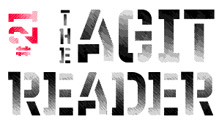
Berlin
by Matt Slaybaugh
It’s hard to believe Lou went 35 years without performing this material. But, you know how Uncle Lou likes to hold a grudge. Famously released as the follow-up to his breakthrough solo outing, Transformer, and sometimes called “the most depressing album ever made,” Berlin was a commercial and critical failure in the U.S. (it reached #7 in the UK). Reed originally intended to follow-up the album with some sort of stage show (the most depressing Broadway musical ever made?), but abandoned those hopes along with performing most of the album’s material in the face of said scorn. Berlin has grown significantly in stature over time, and was recently revived by Reed for a four-night stand at St. Ann’s Warehouse in Brooklyn (comprised now on CD and DVD). This is something of a pattern with Lou’s work; the even less commercially viable Metal Machine Music is now generally accepted as part of the canon of avant garde electronic music and was revived in concert in 2002 by Zeitkratzer, a German chamber group, who convinced Lou to play guitar for the event.
The concert was enhanced by projections by Julian Schnabel’s daughter Lola. Schnabel himself created something of a set for the shows and directed the film. Most of Lou’s regular band is in tow, along with the Brooklyn Youth Chorus, and back-up singers Antony Hegarty and Sharon Jones (stepping-out from their respective Johnsons and Dap Kings). There are also some horns and strings, of course. On the DVD, The projections sometimes take over the screen, and in those cases, they seem forced. They’re not exactly a dramatization of the album, they’re just kind of evocative. But only kind of. When Schnabel runs the film over or behind the concert footage, though, it actually enhances the music’s impact, giving you that gritty Lou-in-the-70s vibe.
For much of the film, it’s a great way to experience the album. Watching this performance is certainly more exciting than listening to it. The group takes the task very seriously, and Lou’s voice is gravelly perfection for most of the night. “Berlin” is a quiet introduction to the story, and then the full group draws first blood on “Lady Day,” melding the plodding chords with full-bodied soul and Steve Hunter’s knife-sharp guitar work. It’s during the next few songs (“Men of Good Fortune” through “Oh, Jim”) that the band starts to have fun. They really start to jam, so to speak. Unfortunately, this is the weaker section of the album, and stretching the songs out by getting Hunter and Reed to repeatedly exchange guitar solos doesn’t improve it much. It is nice, though, to see Lou having a unpretentiously good time.
We get back to the really depressing stuff with the album’s most brutal song, “Caroline Says (II)”. With lyrics like “Caroline says, as she gets up from the floor, you can hit me all you want to, but I don’t love you any more” delivered in Lou’s barely-sung deadpan, there’s not much you can do to keep yourself from getting drawn into the performance. Thankfully, everyone is at their most restrained here. Lola’s projections are especially sensitive; Antony’s voice finally gets some spotlight; and even Lou is cleary effected by the strings-and-piano atmosphere. For this and the three remaining Berlin tunes, Lou isn’t just singing, he’s enacting the drama and living in the music. Lou’s emotion on “The Kids” builds from misery to rage; the children’s voices on “The Bed” induce chills; the band builds to a grand climax for “Sad Song.” For these four songs at least, these performances are nothing less than definitive.
An encore also features performances that have been popular at Lou’s recent concert appearances. Antony takes the lead for the Velvet-era “Candy Says,” and “€śRock Minuet” from Lou’s most recent successful album, Ecstasy, gets a straightforward, subdued reading during which Lola projects images of the Rock ‘n’ Roll Animal-era Reed. The concert ends and the credits roll over “Sweet Jane.” Lou once said he built his entire career on the four chords that open the song. There’s plenty of evidence here, though, that it’s just not true.
Jandek at the Wexner Center
Live reviews of My Morning Jacket and Echo and the Bunnymen
Radio Silence/A Selected Visual History of American Hardcore Music
Columbus Discount Records vs. Sub Pop
Skins & Punks
Kraftwerk and the Electronic Revolution
Agent Orange Live Review
Alice Cooper Live Review
The Shoegaze Top 10
Digital Downloads Round-Up
Live Reviews of Radiohead and Bon Iver
Joe Strummer: The Future Is Unwritten
An Agit Writer at the Pitchfork Festival
Daft Punk's Electroma
